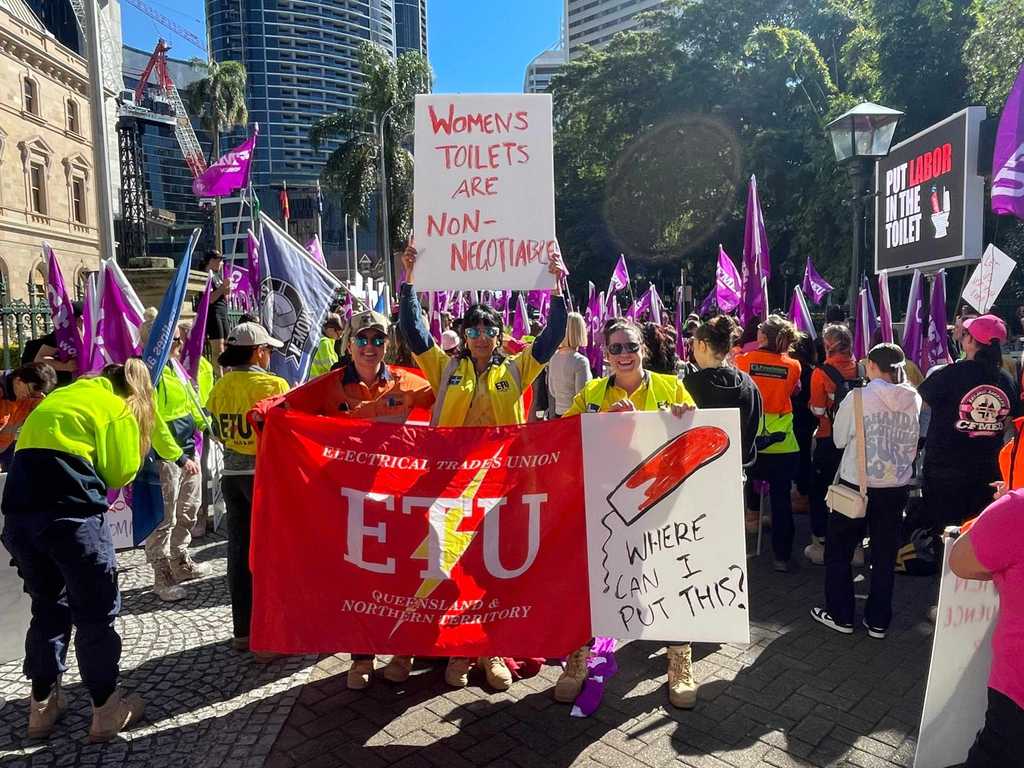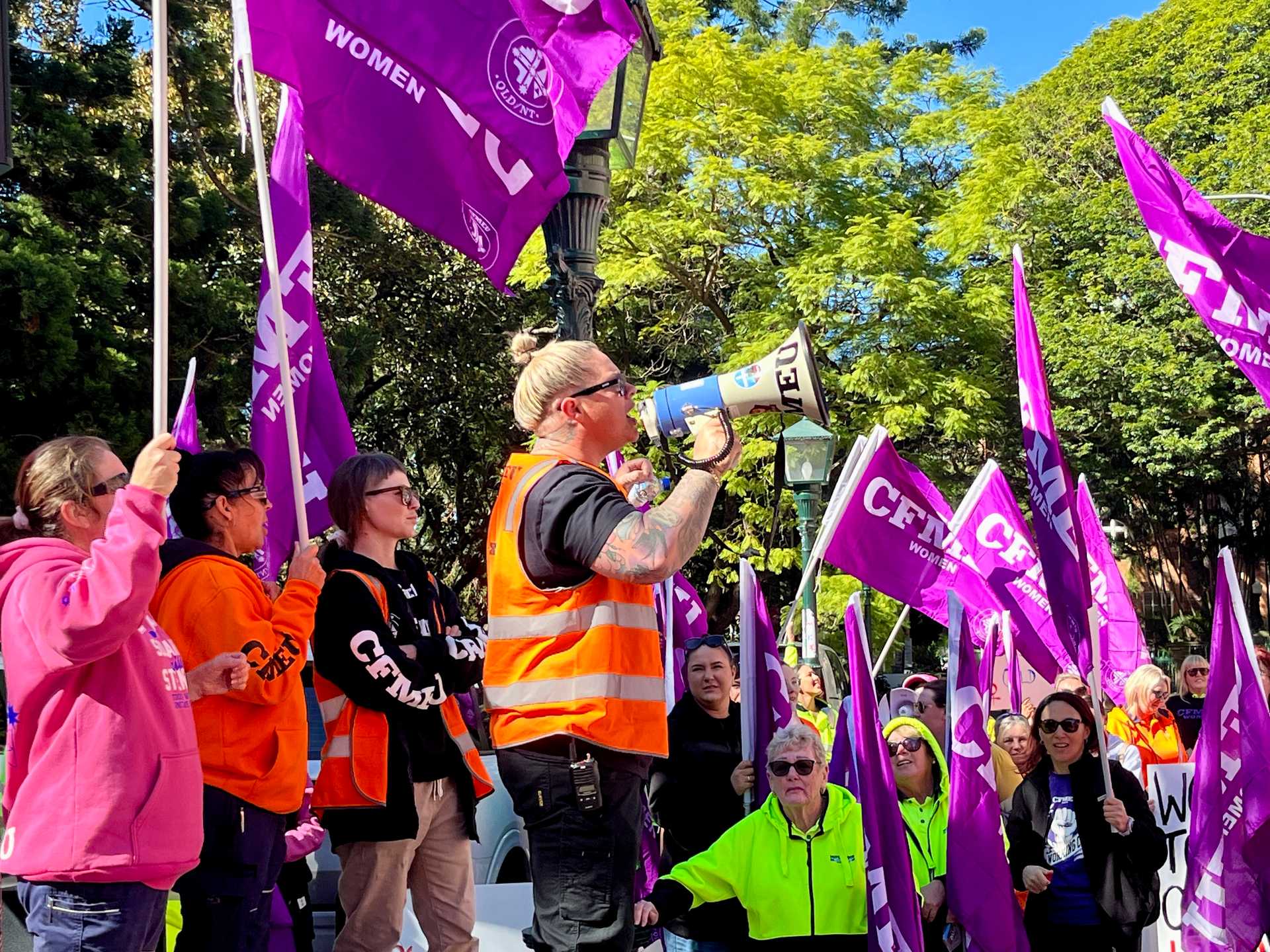On June 11th, women construction workers rallied in the Brisbane CBD outside Queensland Parliament, demanding to use the women's bathroom. This rally was held to protest the lack of women's bathrooms on construction sites.
In 2021, the ABC interviewed sparkie and Electrical Trades Union (ETU) member Vashti Arndt, who said, "I definitely have been on sites where there's only one portable toilet and there's no sanitary bin in that, so you have to find the closest skip and do like a real awkward sort of walk to the bin and hope no-one notices you've got a handful of tampon."
She also noted that when female toilets are available they’re hundreds of metres away from her work area. "Someone complained about me not being on site because I would go to the toilet and be gone for a 20-minute circuit, essentially."
This is just one example of a widespread issue in the industry.
Portaloos and Parliament
Despite pandering rhetoric from bosses and politicians about getting women into construction, they are unwilling to spend the money for women's facilities. Companies relish the opportunity to appear progressive, but are unwilling to provide their workers with basic necessities. This shouldn’t come as a surprise for workers, if our bosses think they can get away with depriving us of something; pay, safety equipment, training; to save a buck, they will. Workers have to fight to get what they need, this fight is best waged together with your co-workers and backed by your union, rather than alone.
The women's bathrooms in Parliament are being targeted because legislation is being stalled by female bosses and politicians who themselves have easy access to clean women's restrooms. There are a number of powerful female construction executives and government officials, including Industrial Relations Minister Grace Grace.
How could this happen?
The Limits of Liberal Feminism
The goal of liberal feminism is to “smash the glass ceiling” and get an equal share of women into the ruling class. It is assumed that by electing women politicians and promoting women executives, they will fight for women's issues. What this ignores is that a fundamental component of capitalism—of which governments and corporations are integral—is the exploitation of women. When anyone enters the halls of power, they must make concessions to the logic of capitalism, and before long, they find themselves defending the same forces they swore to dismantle.
We don’t need women rulers to give us more compassionate orders, we need organised, empowered women who will fight for the power to determine their own lives.

All workers are exploited. Each worker creates, or contributes to the realisation of, a certain amount of value on the job; some of this value is paid to them, while the majority is hoarded and reinvested by the bosses. A variety of factors influence our share of the value we produce, including how well we can fight the bosses.
This exploitation is worse for women, who often receive a smaller share of this value compared to male workers. This is due to capitalism's weaponisation of sexism to undervalue womens labour. Jobs associated with women, known as “feminised”, such as teachers or secretaries, are often poorly paid. Within construction, the most feminised jobs are cleaners and traffic controllers. It is no coincidence that scandalous articles about “overpaid” traffic controllers often focus on a woman posting about her pay on social media. The bosses make women workers look like a threat to men in order to divide and conquer.
Sexism is the Bosses Weapon, Solidarity is Our Shield
For some, it may seem strange that male dominated construction unions are fighting for women's issues, however this struggle goes back decades.
For example, in the 70’s the NSW BLF made alliances with feminists to get women on the job. Before the union's intervention, construction was a purely male affair. The union's membership took militant action to get women hired and respected on the job. Workers would “work in” women who the company refused to hire by bringing them on site to work. If the women weren’t paid, the workers would stop work until they received a paycheck. The socialist feminists who were worked in during this time became talented organisers in the union, contributing to the militant force that the NSW BLF became during the 70’s.
This worker's action is an important example of how women can fight for feminist issues. Instead of hoping for female bosses or electing politicians to disappoint us, we need to take action for ourselves. This is difficult to do in isolation, so we need to get organised and band together with people in the same situations as us. The most powerful way to do this is class organisations like trade unions. By fighting alongside our fellow workers, regardless of gender, we increase our power. Issues that affect the whole working class often affect women the most, the fastest growing group among the homeless is older women. By struggling together we improve our lives and build solidarity. When women's issues are on the table, male unionists need to stick by their comrades, just as male tradies have done at this rally.
It will be through organising at our workplaces that we will win demands like an end to the gender pay gap. Rallies targeting politicians and laws are good, but the basis of campaigns like this need to be waged on the shop floor. Powerful social forces create better laws, not the other way around. Building workplace organisation is more realistic than expecting top-down reforms.
No accessible bathrooms on site?
Organise your co-workers to demand better.
Your manager is a misogynist pig?
Organise your co-workers to demand better.
Maternity leave is barely enough to get you out of the hospital?
Organise your co-workers to demand better.
Ultimately, the degree to which women's autonomy can be expanded is limited by the nature of capitalism. The system depends on the suffering of women. If we want true freedom, we need to replace it with something better. A system where everyone takes an active role in decision-making, rather than leaving it to politicians: anarchism. A system where workers can manage their work collectively for the good of society, not for profit: communism.
Liberal feminism isn’t enough. We need a working class feminism that fights the ruling class head on. A woman's place isn’t in the kitchen, it isn’t in the parliament; it’s in the revolution.
